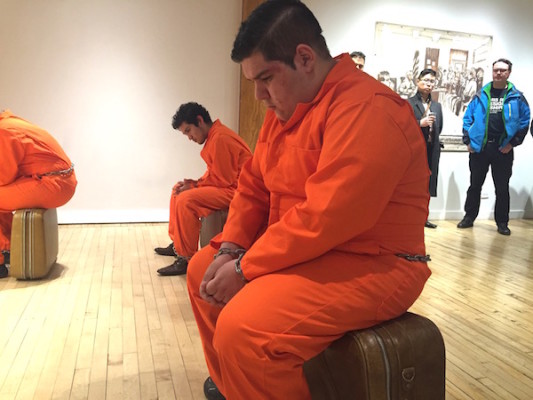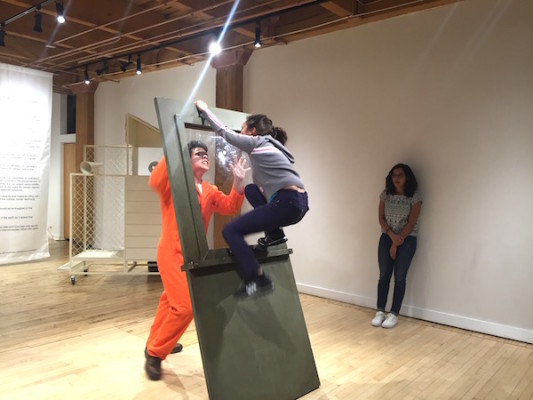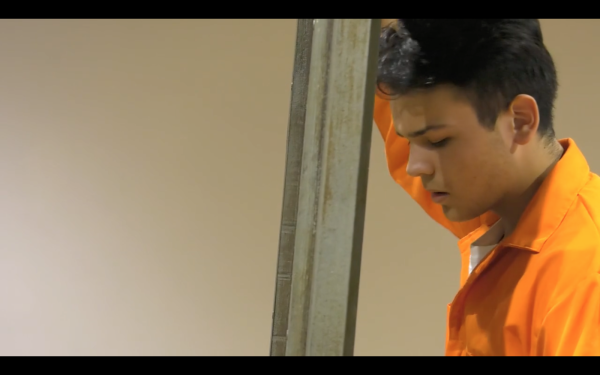Clad in orange jumpsuits, a group of high school students carrying large suitcases trudged onto the center stage. Heads down with hands, feet and waists shackled, they took a seat on their suitcases while two girls dressed as nuns slithered through the “criminals” and settled in front of them.
“Outside, the deportation bus looks like just a regular coach, but on the inside, Plexiglas separates us from the men and women,” one of the nuns narrated in a somber tone. “You can’t walk down the aisle. You can’t just touch them on the shoulder to say goodbye.”
Desperate, one of the deportees called to the nuns in Spanish: “Please tell my wife that I love her and take care of my children.”
An excerpt from a play called Home/Land, this short snippet about immigration was performed by a multiethnic youth theater ensemble, Albany Park Theater Project (APTP), last Friday at Weinberg/Newton Gallery in Chicago’s River North District. Based on first-hand accounts, the performance aims to provide a glimpse into the plights of undocumented immigrant families in the face of detention and deportation systems.
“This is an issue that hit home for us,” said Rossana Rodriguez, resident director of APTP. “A lot of our company members are part of a family in which one of the members is undocumented or sometimes they are undocumented themselves. And we thought it was really important that we started talking about it.”
Using a variety of media – theatre, music and visual arts – the ensemble particularly deals with the issue of the unwanted separation of immigrant families.
With rising immigration enforcement in the interior of the U.S., the odds of undocumented immigrant families experiencing the deportation of a parent or a child is at an all-time high, according to The Migration Policy Institute. In 2013 alone, deportations accounted for more than 430,000 cases. Nearly 500,000 unauthorized immigrants live in Illinois, and Mexican nationals constituting the overwhelming majority currently live in fear of family separation.
“So the message we wanted to convey is how unjust this country is at times and how unfair people are treated for things that aren’t really considered crimes,” said Carlos DeSantiago, a junior at Chicago High School for the Arts and cast member who played the role of a deportee.

Carlos DeSantiago, a cast member of Albany Park Theater Project, plays the role of a deportee in a performance at Soul Asylum. (Jenny Lee/Medill)
Rodriguez noted that the performance was the fruit of hard work on the part of the original cast and crews of APTP back in 2012. In order to bring it to life, they joined Chicago’s immigrant justice movement in its meetings, marches and vigils, visited the deportation center in Broadview and conducted countless interviews with nuns, priests and immigrant families.
“It was a really nerve-racking experience,” said Rodriguez, reminiscing about the time when she went to the deportation center. “It became really real and I think it was one of the most inspiring experiences that we had in the process of making the play… to be able to be a part of that experience.”
The current cast members said they too found a strong connection to the characters they were portraying with the help of the directors and the alumni of APTP.
“We read some of the interviews that [the original teen cast] conducted...and that was almost just as powerful as being there,” said Gustavo Duran, a Lane Technical College Prep High School student who also played a deportee. “That really did fuel us to do what we did here tonight.”
The night’s performance was less than 10 minutes in length and yet evoked intense emotions in the small group of audience members; some were stifling tears while others solemnly stood by.
“It was like a glimpse into their souls. These incredible young people, who clearly have a personal connection where they themselves have experienced this, are expressing clearly the challenge of becoming an immigrant in our American society,” said Elizabeth Moriarty, operations manager at the Archdiocese of Chicago. “So they really were living this story. They were living art.”

Two cast members from Albany Park Theater Project performs at Weinberg/Newton gallery last Friday. (Jenny Lee/Medill)
Isabel Bravo broke into tears while watching the scene in which a father bid emotional goodbye to his daughter.
“You know that connection between the child and the father doesn’t just end there. It keeps going on further,” said Bravo, who is 17 and half Puerto Rican and half Mexican. “A lot of people think that when someone gets deported, it’s just that one incident, it stops there. But that stays with the child for a long time because it’s their family. You can see how strong it had an impact on me.”
APTP is dedicated to telling stories of working class immigrants living in Chicago that otherwise would go untold. Prior to Home/Land, the theater company tackled a wide variety of themes including food insecurities, housing and education.
The performance by APTP was part of Soul Asylum, an art exhibition focusing on immigrants’ struggles, in collaboration with Human Rights Watch and Interfaith Committee for Detained Immigrants (ICDI) in Chicago. The exhibition which opened on Jan. 22 will continue until March 26, featuring other artists including Tania Bruguera, Diaz Lewis and Jenny Polak.
—Jenny Lee (text) & Xiao Lyu (video)
 Menu
Menu
